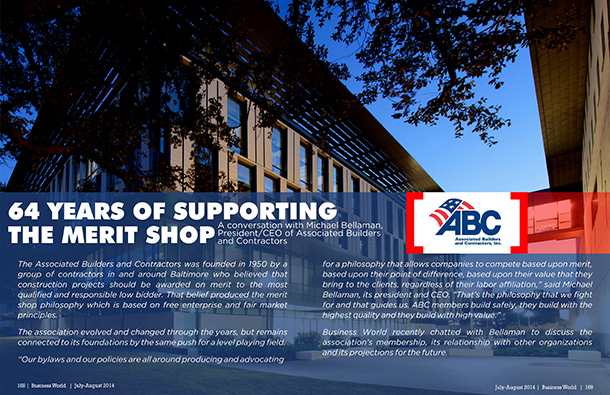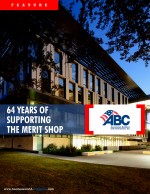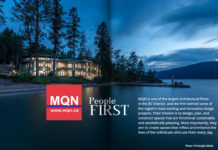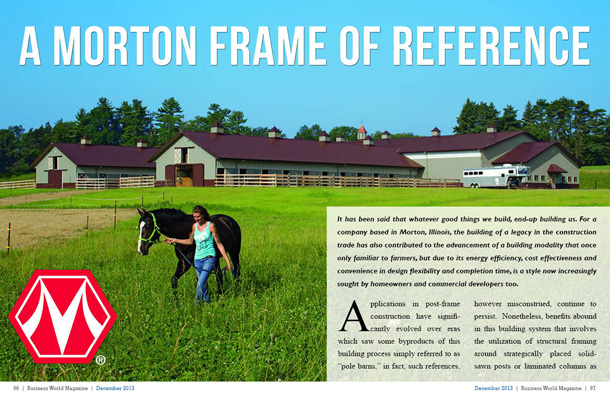
64 Years of Supporting the Merit Shop
A conversation with Michael Bellaman, president/CEO of Associated Builders and Contractors

The Associated Builders and Contractors was founded in 1950 by a group of contractors in and around Baltimore who believed that construction projects should be awarded on merit to the most qualified and responsible low bidder. That belief produced the merit shop philosophy which is based on free enterprise and fair market principles.
 The association evolved and changed through the years, but remains connected to its foundations by the same push for a level playing field.
 “Our bylaws and our policies are all around producing and advocating for a philosophy that allows companies to compete based upon merit, based upon their point of difference, based upon their value that they bring to the clients, regardless of their labor affiliation,†said Michael Bellaman, its president and CEO. “That’s the philosophy that we fight for and that guides us. ABC members build safely, they build with the highest quality and they build with high value.â€
 Business World recently chatted with Bellaman to discuss the association’s membership, its relationship with other organizations and its projections for the future.
BUSINESS WORLD: Talk to me about the everyday operation. In terms of your membership, what sort of numbers are you at right now and how has that changed recently?
MICHAEL BELLAMAN: The downturn has hit the construction industry. Even off-peak, depending on what market you look at, the industry is down 30 to 70 percent down on various markets. Our membership has been fairly solid; it has not seen the decreases that would be equivalent to those kinds of declines. We currently have about 21,000 members but, at the industry’s peak, it was about 24,000 members, including contractors, associates and suppliers. Actually, our contractor base membership has remained fairly steady over the course of that same period. The biggest decline we’ve seen is maybe in the associate area.
BUSINESS WORLD: Are there other associations out there that you would consider competitive or similar, on a national scope, that have the merit shop philosophy as well? Or are you guys pretty much the voice for that mindset?
 BELLAMAN: There are a lot of construction trade associations out there, but ours is mainly based upon that merit shop philosophy. What we do, based on that foundation of merit shop, is help our members win work, develop people, and do a lot of training. We help them deliver work safely. We help them deliver work ethically, helping everybody understand what their roles are and helping them comply with the rules. We help them be more profitable by helping them with productivity and providing a lot of good discount programs for our members. We do a lot of work with the community as well, because in the construction industry, we employ people in our communities that we work within.
BUSINESS WORLD: Now, you mentioned, as far as your membership goes, a significant amount of your base is contractors as members. Is there a typical member profile – what does the most often occurrence look like? What sort of entity is most often represented in your membership?
 BELLAMAN: When you take a look at our trade breakdown, we represent all of the different trades. Whether it’s general contractors, excavators, mechanical contractors, masonry – we represent everyone that does work within the construction industry. The size of our membership also varies. We have members that have less than 10 employees, and we have members that have over 1,000 employees.
BUSINESS WORLD: Do you have one particular value that you think you provide most to your members?
 BELLAMAN: We advocate the merit shop philosophy. That’s what we were founded on, and that’s the foundation of all that we do. We help our members win work, develop people and deliver that work safely, ethically, profitably, for the betterment of the communities we work within. When you look at members and why they join ABC, many join solely for their belief in the merit shop philosophy. A number of members also join us because of our training programs, our craft professional training programs, our safety programs, our leadership development programs, etc. Other members join because of the networking and business development opportunities. So, you know, the value proposition, if you have to narrow it down to the foundation, it’s founded on that merit shop philosophy, but there’s a lot of value that our members get out of their membership in terms of ABC helping them win work and deliver work.
BUSINESS WORLD: As far as membership goes, is there a main issue these days that the majority of the people in the association are concerned about? What’s at the top of their agenda as far as things they’re keeping an eye on, or things they might be concerned with?
 BELLAMAN: Our core issues are around labor, making sure that the rules, regulations and laws of the land create a fair, level playing field, and recognizing individuals based upon their performance, based upon the value that they deliver, their productivity, etc.
We are all about the government being neutral in procurement, not mandating work be done by non-union workers, or solely by union workers. We prefer to have the rules be in such a way that the contractor that provides the best value proposition for a project wins the job. And the same goes for employees—for the people that deliver value, they’re rewarded accordingly.
BUSINESS WORLD: Talk to me about ways that the association goes about engaging the membership. Some associations have events every year, some have publications – what ways have resonated the most with your members?
BELLAMAN: From a political advocacy engagement perspective, we have an app for smart phones – it’s called the ABC Action App. It’s a grassroots advocacy tool that basically allows a member to put in their personal profile in terms of their address, where they live, and it gives them their congressmen, their senators, etc. We have our core issues that are loaded into the app, so people understand what those issues are, what our positions are on those issues, and any time there is an action that is required – perhaps the need to send a letter to their congressmen or senator on a particular issue that might be coming up for a vote – that app allows them to engage in a political advocacy, grassroots action.
Another example of how we engage our members is through our National Craft Championships, our craft training programs, and our partnership training programs. Having a skilled workforce and the most productive workforce that’s available in the construction industry is important to us. Every year, we have local and national competitions for our craft trades and that usually happens every spring. This past year, we had it in Birmingham, Ala. For the next three years, we’ll be hosting it in Ft. Lauderdale, Fla. We get more than 150 competitors that work their way up through the local competitions to compete in the national competition. It’s very engaging for the members in terms of the craft trade.
We also have our Safety Training Evaluation Process (STEP), which is all about developing world-class safety. We are very passionate about safety. STEP is an annual assessment process that allows companies to assess their safety performance against best practices and best in class. There are a number of different levels of recognition that culminate in our National Safety Excellence Awards given during the Excellence in Construction Awards ceremony. Winners are chosen based on upon their performance for the previous year, and our Pinnacle award is for those that continue to achieve best-in-class safety performance over a multi-year period. ABC members that participate in STEP see total recordable incident rates up to 38 percent below the Bureau of Labor Statistics industry average.
In addition to the safety awards, ABC’s Excellence in Construction Award ceremony recognizes our members, their clients, their subcontractors, and architects that build outstanding projects. The winning projects have to be built without incident, they have to be built to the highest quality, they have to deliver exception value, and there’s a very rigorous process that, in order to win at the national level, you have to win at the local level. It’s a big event for us and it’s something that our members really cherish— something that gives them recognition— and the owners love it.
BUSINESS WORLD: Talk to me about the next five years. If we were to have this conversation again in 2019, how do you anticipate the industry might look five years from now that’s different from the way it is now? And what sorts of things do you think you’ll be paying the most attention to at that time period?
 BELLAMAN: Every year, we strategically plan for five years out. We have long-term strategic objectives that we focus on that will take us to a world-class level in safety, political advocacy, workforce development, growing our membership, diversifying our membership, as well as increasing our technological capabilities.
As we look toward that five-year future, some headlines would be in safety. We look at ourselves as leaders in the industry with our STEP program, our safety academies, and our efforts in furthering the reach of the Construction Coalition for a Drug- and Alcohol- Free Workplace. Up to one-third of all workplace incidents are drug- and alcohol-related. That’s why we joined other construction groups to form this coalition. All members of the industry can take the pledge to create drug- and alcohol-free jobsites at drugfreeconstruction.org. There are also best practices and model policies. The idea here is to essentially eliminate fatalities and incidents from our industry and increase the effectiveness of our industry from a safety perspective. We are constantly striving to do that and our goal is to make our industry incident and injury-free.
From a workforce development perspective, there are a lot of opportunities. There’s a workforce/skilled workforce gap and we’re focused on improving the construction industry’s image. We do a lot of work with our partners, NCCER, Build Your Future, Go Build, ACE Mentor, Skills USA, and others to create a positive image for the industry. Construction is a great career path for people coming out of high school or college and there’s a lot of new technologies that are emerging with regard to building information modeling (BIM), GPS technology and 3-D printing, so we’re in a situation where we’re always looking for ways to become more productive, provide more value to our construction users, and add to our workforce development and productivity efforts. In fact, ABC recently launched a suite of BIM training classes, assessments and product discounts called Project Virtual targeted directly at contractors.
From the political advocacy perspective, we work to support pro-business candidates that will defend the merit shop philosophy of free enterprise and open competition. ABC’s Political Action Committee (PAC) is consistently among the 10 most active national association PACs and we look forward to expanding our activity over the next five years.
We also embarked on a long-range strategy to make sure that at the state level, there were laws in place protecting government neutrality toward a contractors’ use of project labor agreements (PLAs). We think taxpayers get the best value if the government neither prohibits nor encourages the use of union/ non-union labor. We support fair and maximum competition in the marketplace free from special interest set-asides, which is the only way to guarantee taxpayers get the best possible product at the best possible price. Since we started this effort in 2011, 17 states have enacted these pro-taxpayer measures. A total of 21 states now have government neutrality laws and we will continue this state-level campaign. We do a lot at the federal level as well. In 2009, President Obama issued an executive order encouraging federal agencies to require, on a case-by-case basis, the use of PLAs on federal contracts exceeding $25 million. An interesting statistic: between FY 2009 and FY 2013 there were 1,034 contracts over $25 million. Only 10 of those projects were subject to government-mandated PLAs or PLA preferences. ABC members won about $40 billion out of the $65 billion worth of large-scale contracts, which demonstrates the ability of our members to compete and win work in a truly free marketplace. We’ll continue these types of efforts to defend free enterprise, promote open competition and a level playing-field for our companies, our members, and their employees.







